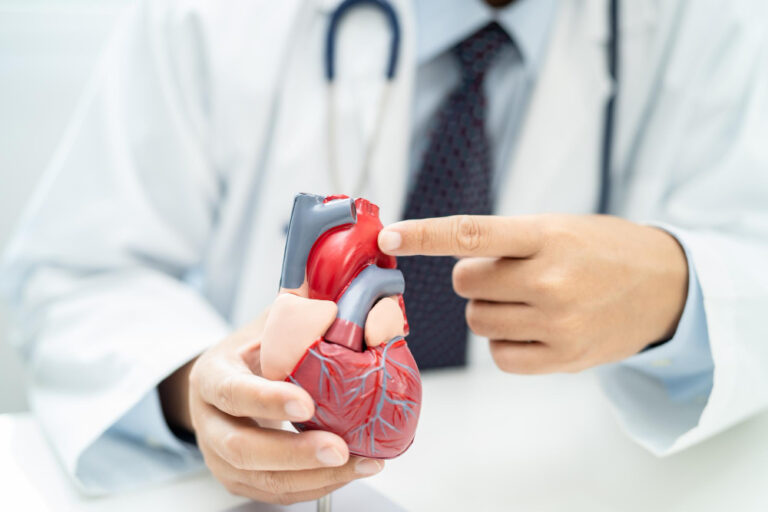
In today’s fast-paced world, stress has become an almost constant companion. While short-term stress can be a natural response to challenges, chronic stress can silently wreak havoc on your body — especially your heart.
This article dives deep into the link between stress and heart health, the warning signs to watch for, and effective steps you can take to protect your cardiovascular system.
Understanding the Stress-Heart Connection
When you’re stressed, your body releases hormones like adrenaline and cortisol, triggering the “fight-or-flight” response. This causes:
- Increased heart rate
- Elevated blood pressure
- Tightened blood vessels
- Inflammation in the body
Over time, these effects place a heavy burden on the heart and blood vessels, increasing the risk of heart disease, heart attacks, and stroke.
How Stress Damages Your Cardiovascular System
Chronic stress doesn’t just make you feel overwhelmed — it actively contributes to several heart problems:
1. High Blood Pressure
Stress temporarily raises blood pressure. When experienced frequently, it can lead to hypertension, a major risk factor for heart attacks and strokes.
2. Inflammation in the Arteries
Stress can trigger inflammation in the body, which contributes to plaque buildup in the arteries (atherosclerosis).
3. Irregular Heart Rhythms (Arrhythmia)
Sudden or prolonged stress may lead to palpitations, skipped beats, or more serious arrhythmias — all of which stress the heart further.
4. Poor Lifestyle Habits Triggered by Stress
People under stress often resort to unhealthy coping mechanisms:
- Overeating or eating junk food
- Smoking or drinking
- Skipping exercise
- Poor sleep
All of these increase the risk of heart disease.
5. Weakened Heart Muscles
In rare cases, extreme emotional stress can cause a condition called stress cardiomyopathy (also known as “broken heart syndrome”), which mimics a heart attack and temporarily weakens the heart.
Signs That Stress May Be Affecting Your Heart
You may not always realize that your heart is under stress. Look for these warning signs:
| Symptom | Possible Cause |
|---|---|
| Racing or irregular heartbeat | Adrenaline response |
| Shortness of breath | Shallow breathing due to anxiety |
| Chest pain or tightness | Tension or early sign of a heart issue |
| Fatigue or exhaustion | Constant physical stress |
| Sleep disturbances | Elevated cortisol levels |
If these symptoms are frequent or intense, consult a doctor — especially to rule out any underlying heart condition.
Who Is Most at Risk?
While stress affects everyone, these individuals may be at higher risk of stress-induced heart problems:
- People with high-pressure jobs
- Caregivers and single parents
- Individuals with a history of heart disease
- Those with anxiety, depression, or PTSD
- People with poor work-life balance
How to Reduce Stress and Protect Your Heart
Managing stress is not just good for your mind — it’s vital for your heart. Here are evidence-based techniques to help you stay calm and heart-healthy:
1. Practice Deep Breathing and Meditation
- Slow, deep breathing reduces blood pressure and heart rate.
- Meditation or mindfulness for even 10–15 minutes a day can improve heart function.
✅ Try this: The 4-7-8 technique (inhale for 4 seconds, hold for 7, exhale for 8).
2. Get Regular Exercise
- Physical activity helps burn off stress hormones.
- It improves mood and cardiovascular health simultaneously.
✅ Aim for 30 minutes of moderate exercise (walking, swimming, biking) at least 5 days a week.
3. Eat a Heart-Healthy Diet
- Nutrient-dense foods can stabilize your mood and energy levels.
- Avoid processed sugars, high-fat foods, and too much caffeine.
✅ Include leafy greens, whole grains, nuts, and omega-3-rich foods like salmon.
4. Prioritize Quality Sleep
- Lack of sleep increases cortisol, heart rate, and blood pressure.
- Create a consistent bedtime routine to improve sleep quality.
✅ Aim for 7–9 hours of uninterrupted sleep.
5. Stay Connected with Loved Ones
- Talking with family or friends helps reduce anxiety.
- Emotional support lowers stress and promotes healing.
✅ Even a 10-minute phone call with someone you trust can make a difference.
6. Set Boundaries and Learn to Say No
- Overcommitting increases mental burden and heart strain.
- Protect your time and energy by prioritizing tasks.
✅ Use a planner or time-blocking system to manage daily stress.
When to Seek Medical Help
If you’re constantly overwhelmed, and especially if you’re experiencing:
- Chest pain
- Severe fatigue
- Panic attacks
- Irregular heartbeat
…then it’s time to see a cardiologist or mental health professional. Stress might be the symptom, but the root cause could be cardiac.
Conclusion
Stress may be invisible, but its impact on your heart is very real. From spiking blood pressure to encouraging harmful habits, it chips away at your cardiovascular health day by day.
By recognizing the signs early and implementing lifestyle changes, you can reduce stress levels, improve your heart health, and reclaim control over your well-being.
Remember: Caring for your heart starts with caring for your mind.
FAQs About Stress and Heart Health
1. Can stress really cause a heart attack?
Yes. Prolonged stress increases blood pressure and inflammation, which can contribute to plaque rupture and heart attack.
2. Is all stress harmful for the heart?
No. Short bursts of stress can be normal and even beneficial. It’s chronic, unmanaged stress that becomes dangerous over time.
3. How do I know if chest pain is from stress or a heart issue?
It’s difficult to tell without medical tests. Always treat chest pain seriously and consult a doctor immediately.
4. Can meditation actually help prevent heart disease?
Yes. Regular meditation has been shown to lower blood pressure, reduce cortisol, and improve overall cardiovascular health.
5. Are women affected differently by stress-related heart issues?
Yes. Women may experience more subtle symptoms and are more prone to conditions like stress cardiomyopathy or “broken heart syndrome.”






